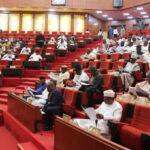
The NiMet boss disclosed this at a one-day high-level advocacy workshop on ramping up access to climate information services for national development and food security in Nigeria, organised by the Human and Environmental Development Agenda, on Wednesday in Abuja.
He noted, “This flood has cost the country over $4.6 billion, and that is a significant weight on our GDP.
“Notwithstanding, we are recovering very fast, and the government has already commissioned a presidential committee to come up with lasting solutions to floods and see how we can better utilise the flood waters, which mostly come up from within the country, to improve our agriculture.
“The agency is working assiduously to align with the present government’s policy in achieving food security, sustainability, and availability to all Nigerians.”
Describing climate change as a serious challenge in the country, he said there is local evidence of climate change in Nigeria, adding that the “agency would leverage on a partnership to be able to work with relevant stakeholders to come up with localised adaptation and mitigative measures that Nigerians will adopt in proffering climate-smart agricultural advisories and services through agriculture extension agents system to be able to yield and thereby increasing the food security and stability in the country.”
Speaking earlier, the Executive Secretary of HEDA, Sulaimon Arigbabu, blamed the lack of access to climate information services for the losses suffered by farmers caused by flooding.
Arigbabu said Nigeria’s food crisis and insecurity are driven by resource constraints triggered by climate change.
He said, “You will recall, there was a major flooding that happened in Nigeria last year. What many did not know is that something close to that happened this year, maybe not as negatively as that of last year, but because the impact of last year’s flooding still lingers in communities, this is an additional stress for us, especially for our food-producing community.
“We went around many communities and realised that farmers continue to suffer even post-flooding. This is because the kind of support that they will need to be able to lift themselves out of poverty to be able to lift this country out of food insecurity and potential crises may not be reaching them.
“There are many issues, of course, bedevilling agricultural production in Nigeria, but a major one that usually doesn’t get the required attention is the lack of access to climate information services.
“Information also needs to get to the farmer when they are about to start preparation for planting because almost often because of changing rainy patterns, many times farmers go to production before the time, and they lose a lot. And sometimes they don’t get information about what to plant and what not,” he stated.





